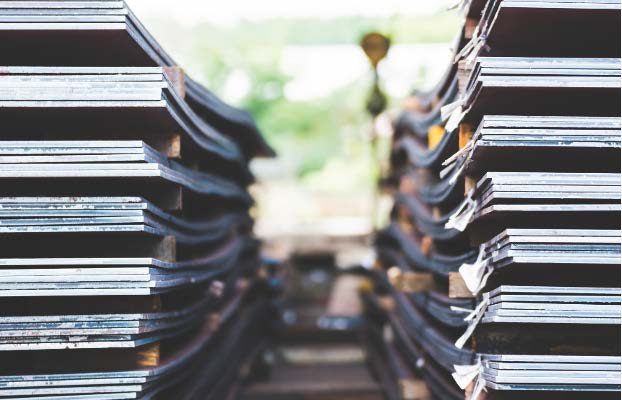
What you need to know before purchasing steel plates
You will learn more about the standard types, sizes, and grades in this quick guide to steel plates, and the importance of selecting a quality supplier.
Selecting the most common types of steel plates
A-36 a structural carbon steel plate used for general purposes - lightweight structures and equipment. Weldable, formable, with good strength levels. (Minimum yield point of 36,000# psi (*see information at the end of this post about yield).
A572-50 a low alloy plate with a good combination of strength and weldability. Minimum yield point of 50,000# psi. (* see information at the end of this post about yield).
AR400 abrasion resistant plate - medium carbon, high strength steel designed to a minimum hardness of 360 Brinell (*see information at the end of this post about Brinell). It offers an exceptional amount of sliding and impact resistance. AR400 is the most popular type of abrasion resistant plate.
Three main types are available in a various degree of hardness - AR235 (medium carbon manganese steel with moderate hardness of 212 to 255 Brinell, AR400 (minimum hardness of 360 Brinell), AR500 (specially designed to reach an amazing nominal hardness of 500 Brinell. Built in strength and superior through hardness gives 500 exceptional resistances to both impact and sliding).
T1 quenched and tempered high strength alloy steel with a yield strength nearly 3x that of A36. This material offers high strength plus good workability and weldability with minimum pre-heating. Exceptional toughness at low atmospheric temperatures (to -50F).
What grade should I use for my application
A general quick guide for selecting steel plates is:
A36 general purpose carbon steel plate.
Applications: Structural application for welded, bolted, and riveted buildings, bridges, and general fabrication structures and equipment.
A572-50 slightly stronger low alloy plate, which is a good strength to price ratio.
Applications: Bridges, buildings, construction equipment, freight cars, machinery, truck parts.
T1 very strong alloy plate.
Applications: Used extensively for component parts and liners for construction equipment, mining machinery, truck bodies, and chutes. Fabricated bridge, tower and building members, components such as frames, bases, supports, and base or body plates for earthmoving or transport equipment, booms, dipper sticks, and bucket parts for power shovels or cranes.
AR400 Good for sliding and impact resistance.
Applications: Liner in material handling equipment such as grains, coal, cement, sand, gravel, and earth. Frames, chutes, buckets, hoppers, conveyors, mining, and agricultural implements.
Standard sizes of steel plates
A36, A572 and T1 are mainly available in 8’x20’ plates
AR400 typically comes in 8’x24’ and sometimes 8’x20’ plates
Questions to Ask When Selecting a Supplier
It’s important to select a quality supplier when ordering steel plates for your applications. A knowledgeable supplier can keep your projects moving forward by understanding your applications, timelines, and requirements. They will offer a collaborative onsite visit to help you make the right steel plate selection.
Double check to make sure your supplier can process the steel plate and cut it to size. Ask if they can cut it into shapes like rectangles, squares, circles, donuts, sketches and make sure they can do holes and slots on the interior.
Ask for an onsite visit. Have your sketches or parts available. Ask for a sample of the product to ensure it meets your quality standards. A good supplier will ask questions and pay attention to details like tolerances, packaging, deburring, and marking plates with part numbers to reduce rejects and errors.
Will they offer some guidance on the options of different plate grades available? This is hugely important if you’re not sure which grade to select that’s right for your application.
Is their ordering process easy and hassle free? Is their communication transparent and honest?
Lastly, check up on their lead-times. Will they work with you to process the plate within your time frame? Will they offer partial shipments to keep you going?
It's important to find the right supplier and the right relationship. Steel Cities Steels' representatives will answer your important questions and help you find the right product and services for your projects.
Explanation of yield and Brinell
Yield - measure of how well steel can hold up to stress, maximum stress before it starts to change shape.
Brinell Hardness - a scale-indent steel with a hardened steel ball. On the scale 100 is soft, 650 is hard.
Steel Cities Steels has over 70 years of quality custom solutions and experience.
We want to help you find the right solution. Contact us at 800-228-2026 or at info@scsmetals.com so we can help guide you on selecting steel plates and services for your next project.
Author: Mike Anderson, VP of Sales
Mike Anderson has over 25 years of experience collaborating with customers on their projects. He has extensive knowledge on steel, value-added services, and its uses and application. Mike leads the sales team at Steel Cities Steels, Inc. as the VP of Sales.